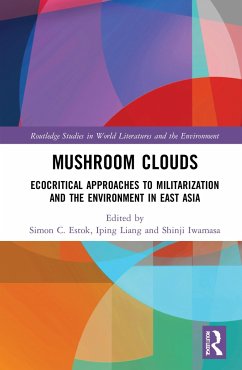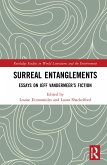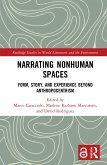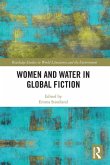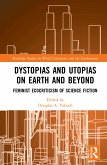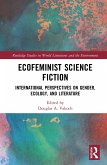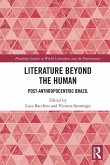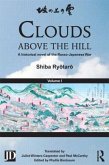Mushroom Clouds
Ecocritical Approaches to Militarization and the Environment in East Asia
Herausgeber: Liang, Iping; Estok, Simon C.; Iwamasa, Shinji
Mushroom Clouds
Ecocritical Approaches to Militarization and the Environment in East Asia
Herausgeber: Liang, Iping; Estok, Simon C.; Iwamasa, Shinji
- Broschiertes Buch
- Merkliste
- Auf die Merkliste
- Bewerten Bewerten
- Teilen
- Produkt teilen
- Produkterinnerung
- Produkterinnerung
Mushroom Clouds: Ecocritical Approaches to Militarization and the Environment in East Asia examines the growing significance of the eco-implications of the increasing militarism of East Asia.
Andere Kunden interessierten sich auch für
![Surreal Entanglements Surreal Entanglements]() Surreal Entanglements47,99 €
Surreal Entanglements47,99 €![Narrating Nonhuman Spaces Narrating Nonhuman Spaces]() Narrating Nonhuman Spaces145,99 €
Narrating Nonhuman Spaces145,99 €![Women and Water in Global Fiction Women and Water in Global Fiction]() Women and Water in Global Fiction44,99 €
Women and Water in Global Fiction44,99 €![Dystopias and Utopias on Earth and Beyond Dystopias and Utopias on Earth and Beyond]() Dystopias and Utopias on Earth and Beyond145,99 €
Dystopias and Utopias on Earth and Beyond145,99 €![Ecofeminist Science Fiction Ecofeminist Science Fiction]() Ecofeminist Science Fiction145,99 €
Ecofeminist Science Fiction145,99 €![Literature Beyond the Human Literature Beyond the Human]() Literature Beyond the Human49,99 €
Literature Beyond the Human49,99 €![Clouds above the Hill Clouds above the Hill]() Shiba RyotaroClouds above the Hill29,99 €
Shiba RyotaroClouds above the Hill29,99 €-
-
-
Mushroom Clouds: Ecocritical Approaches to Militarization and the Environment in East Asia examines the growing significance of the eco-implications of the increasing militarism of East Asia.
Produktdetails
- Produktdetails
- Routledge Studies in World Literatures and the Environment
- Verlag: Taylor & Francis Ltd
- Seitenzahl: 202
- Erscheinungstermin: 26. September 2022
- Englisch
- Abmessung: 152mm x 228mm x 16mm
- Gewicht: 324g
- ISBN-13: 9780367694890
- ISBN-10: 0367694891
- Artikelnr.: 65609902
- Routledge Studies in World Literatures and the Environment
- Verlag: Taylor & Francis Ltd
- Seitenzahl: 202
- Erscheinungstermin: 26. September 2022
- Englisch
- Abmessung: 152mm x 228mm x 16mm
- Gewicht: 324g
- ISBN-13: 9780367694890
- ISBN-10: 0367694891
- Artikelnr.: 65609902
Simon C. Estok (editor-in-chief) currently holds the award of Foreign Expert of the Double First Class Discipline Cluster (2018-2021) at Sichuan University and was the recipient of the Shanghai Metropolitan Government "Oriental Scholar" Award (¿¿¿¿) (2015-18) at the Research Center for Comparative Literature and World Literatures at Shanghai Normal University. Estok is a full professor and Senior Research Fellow at Sungkyunkwan University (South Korea's first and oldest university). He teaches literary theory, ecocriticism, and Shakespearean literature. His award-winning book Ecocriticism and Shakespeare: Reading Ecophobia appeared in 2011 (reprinted 2014), and he is co-editor of four books: Anthropocene Ecologies of Food: Implications and Perspectives from the Global South (Routledge, 2021), Landscape, Seascape, and the Eco-Spatial Imagination (Routledge, 2016), International Perspectives in Feminist Ecocriticism (Routledge, 2013), and East Asian Ecocriticisms (Macmillan, 2013). His much anticipated The Ecophobia Hypothesis was published in 2018 by Routledge and reprinted (with errata) as a paperback in July 2020. Estok has published extensively on ecocriticism and Shakespeare in such journals as PMLA, Mosaic, Configurations, English Studies in Canada, and others. Iping Liang is Professor of English and American Studies at National Taiwan Normal University, Taiwan. She is currently president of the Association for the Study of Literature and Environment, Taiwan (ASLE-Taiwan) and organized the 2018 International Symposium on Literature and Environment, East Asia, from which the idea of this collection germinated. She publishes in the areas of critical plant studies, archipelagic American Studies, Native American literatures, and Asian American literatures in both English and Chinese, including Storytelling Survivance: A Critical Reading of Native American Fiction (2021), I'm Migrant: New Perspective on Overseas Chinese Studies (2018), Asia/America: Asian American Literatures in Taiwan (2013), and Ghost Dances: Toward a Native American Gothic (2006). She served on the International Women's Committee of the American Studies Association (2010-2012) and on the Advisory Board of Multiethnic Studies of Americas and Europe (2014-2020). She is on the Editorial Board of Translocal Chinese: East Asian Perspectives (2018-2021) and on the Advisory Board of the International Society for the Studies of Chinese Overseas (2017-2021). Her current research project, funded by the Ministry of Science and Technology (Taiwan), investigates the plant narratives in East Asia. Shinji Iwamasa teaches at Shirayuri University, Tokyo. His research interests include toxic discourse, Asian thoughts, and ecocriticism. He is a recipient of the governmental scientific research fund for 2017-19 with his project titled, "A Study of Toxic Discourse hinted by the Mythification of Narratives in Obama's Hiroshima Speech." His publications include "Reading Gary Snyder from the Viewpoint of the Place of Nothingness" Literature and Environment, 2008. "The Mechanics of Place in the Writings of Rachel Carson" Ecocriticism Review, 2010; "A Study of Thoreau's Prayer in the Writings of Terry Tempest Williams." Shirayuri Christiano-Cultural Studies, 2013; "Toxic Discourse and the Creation of the Myth of Land in the Writings of Terry Tempest Williams" Themes of Environmental Humanities, 2017, which he edited as well. He co-edited and co-translated Terry Tempest Williams's The Hour of Land, 2019. His professorial affiliations include Stanford University, where he was a visiting scholar from 2011-2012 and currently 2019-2020.
Chapter 1: Nature under Ideological and Utopian Seizures: Recent Political
and Conservationist Discourses and Literary Representations of the Korean
DM, By Doo-ho Shin
Chapter 2: Human No-Go Zones: Theatricalizing Unintentional and Intentional
Wildlife Sanctuaries, By Catherine Diamond
Chapter 3:Blue Blood: A "Silent War" at the Edge of the Sea, By Weibon Wu
Chapter 4: Radiation Ecologies, Resistance, and Survivance on Pacific
Islands: Albert Wendt's Black Rainbow and Syaman Rapongan's Drifting Dreams
on the Ocean, By Hsinya Huang and Syaman Rapongan
Chapter 5: The Lineage of Nuclear Narratives in the Discourses of Terry
Tempest Williams, Fumiyo Kouno, and Barack Obama, By Shinji Iwamasa
Chapter 6: The Peaceful Use of Nuclear Power and Post-3/11 Novels, By
Koichi Haga
Chapter 7: Plant Memories: Hibiscuses, Bamboo Fences, and Environmental
Mourning of Military Villages in Taiwan, By Iping Liang
Chapter 8: Food Ethics and GMOs in Margaret Atwood's Oryx and Crake and
Paolo Bacigalupi's The Windup Girl, By Young-hyun Lee
Chapter 9: Detachment and Division: Militarization, Geography, and Gender
in The Windup Girl, By Simon Estok
Chapter 10: "Seeing Connections": An Ecofeminist Peace Study of Mingyi Wu's
The Stolen Bicycle, By Kathryn Yalan Chang
Chapter 11: In Search of a New Representation of Nature in Post-war
Japanese Literature, By Kazuaki Odani
and Conservationist Discourses and Literary Representations of the Korean
DM, By Doo-ho Shin
Chapter 2: Human No-Go Zones: Theatricalizing Unintentional and Intentional
Wildlife Sanctuaries, By Catherine Diamond
Chapter 3:Blue Blood: A "Silent War" at the Edge of the Sea, By Weibon Wu
Chapter 4: Radiation Ecologies, Resistance, and Survivance on Pacific
Islands: Albert Wendt's Black Rainbow and Syaman Rapongan's Drifting Dreams
on the Ocean, By Hsinya Huang and Syaman Rapongan
Chapter 5: The Lineage of Nuclear Narratives in the Discourses of Terry
Tempest Williams, Fumiyo Kouno, and Barack Obama, By Shinji Iwamasa
Chapter 6: The Peaceful Use of Nuclear Power and Post-3/11 Novels, By
Koichi Haga
Chapter 7: Plant Memories: Hibiscuses, Bamboo Fences, and Environmental
Mourning of Military Villages in Taiwan, By Iping Liang
Chapter 8: Food Ethics and GMOs in Margaret Atwood's Oryx and Crake and
Paolo Bacigalupi's The Windup Girl, By Young-hyun Lee
Chapter 9: Detachment and Division: Militarization, Geography, and Gender
in The Windup Girl, By Simon Estok
Chapter 10: "Seeing Connections": An Ecofeminist Peace Study of Mingyi Wu's
The Stolen Bicycle, By Kathryn Yalan Chang
Chapter 11: In Search of a New Representation of Nature in Post-war
Japanese Literature, By Kazuaki Odani
Chapter 1: Nature under Ideological and Utopian Seizures: Recent Political
and Conservationist Discourses and Literary Representations of the Korean
DM, By Doo-ho Shin
Chapter 2: Human No-Go Zones: Theatricalizing Unintentional and Intentional
Wildlife Sanctuaries, By Catherine Diamond
Chapter 3:Blue Blood: A "Silent War" at the Edge of the Sea, By Weibon Wu
Chapter 4: Radiation Ecologies, Resistance, and Survivance on Pacific
Islands: Albert Wendt's Black Rainbow and Syaman Rapongan's Drifting Dreams
on the Ocean, By Hsinya Huang and Syaman Rapongan
Chapter 5: The Lineage of Nuclear Narratives in the Discourses of Terry
Tempest Williams, Fumiyo Kouno, and Barack Obama, By Shinji Iwamasa
Chapter 6: The Peaceful Use of Nuclear Power and Post-3/11 Novels, By
Koichi Haga
Chapter 7: Plant Memories: Hibiscuses, Bamboo Fences, and Environmental
Mourning of Military Villages in Taiwan, By Iping Liang
Chapter 8: Food Ethics and GMOs in Margaret Atwood's Oryx and Crake and
Paolo Bacigalupi's The Windup Girl, By Young-hyun Lee
Chapter 9: Detachment and Division: Militarization, Geography, and Gender
in The Windup Girl, By Simon Estok
Chapter 10: "Seeing Connections": An Ecofeminist Peace Study of Mingyi Wu's
The Stolen Bicycle, By Kathryn Yalan Chang
Chapter 11: In Search of a New Representation of Nature in Post-war
Japanese Literature, By Kazuaki Odani
and Conservationist Discourses and Literary Representations of the Korean
DM, By Doo-ho Shin
Chapter 2: Human No-Go Zones: Theatricalizing Unintentional and Intentional
Wildlife Sanctuaries, By Catherine Diamond
Chapter 3:Blue Blood: A "Silent War" at the Edge of the Sea, By Weibon Wu
Chapter 4: Radiation Ecologies, Resistance, and Survivance on Pacific
Islands: Albert Wendt's Black Rainbow and Syaman Rapongan's Drifting Dreams
on the Ocean, By Hsinya Huang and Syaman Rapongan
Chapter 5: The Lineage of Nuclear Narratives in the Discourses of Terry
Tempest Williams, Fumiyo Kouno, and Barack Obama, By Shinji Iwamasa
Chapter 6: The Peaceful Use of Nuclear Power and Post-3/11 Novels, By
Koichi Haga
Chapter 7: Plant Memories: Hibiscuses, Bamboo Fences, and Environmental
Mourning of Military Villages in Taiwan, By Iping Liang
Chapter 8: Food Ethics and GMOs in Margaret Atwood's Oryx and Crake and
Paolo Bacigalupi's The Windup Girl, By Young-hyun Lee
Chapter 9: Detachment and Division: Militarization, Geography, and Gender
in The Windup Girl, By Simon Estok
Chapter 10: "Seeing Connections": An Ecofeminist Peace Study of Mingyi Wu's
The Stolen Bicycle, By Kathryn Yalan Chang
Chapter 11: In Search of a New Representation of Nature in Post-war
Japanese Literature, By Kazuaki Odani

